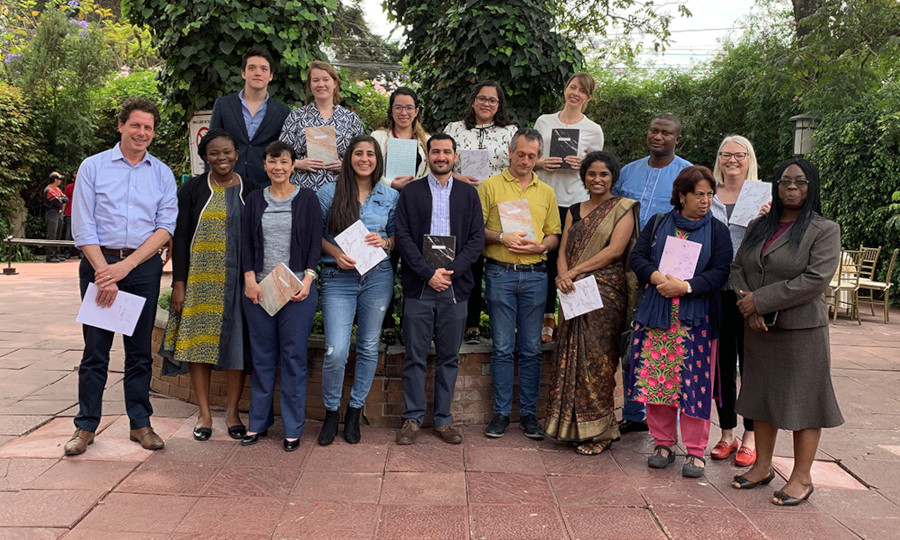Why International Development Needs Storytelling

I’ve always been interested in storytelling. A story is a time-tested way to pass experiences down from one person to another. A story is how wisdom is shared with the next generation, whether a historical text or a bedtime story, and it’s how we as development practitioners inspire action and change. Storytelling got me interested in communications and it’s the reason I believe that we need to build storytelling into all our project plans.
Walking the talk: Think Tanks & Gender

Like all organizations, policy research organizations — also known as “think tanks” — reflect the gendered social norms of their societies. This means that think tanks themselves can either perpetuate gender inequalities or foster gender equality in their organizational structures and research processes.
why care is a political act
There are many ways to understand what care means. Here, we define it as looking after the physical, emotional, spiritual and mental wellbeing, safety and dignity of ourselves and others. Too often, the focus is on a narrow form of self-care, forgetting the essential, and deeply political collective care approach, which includes our families, friends, colleagues and community.
Episode 11: Post Beijing
It’s almost 25 years since the landmark women’s conference held in Beijing in 1995. What did women achieve at Beijing and what are some of the key new and unfinished feminist agendas? In this podcast, Joanne Sandler, the former Deputy Director of Unifem and current senior associate at G@W, starts us off by tracing some of the intentions, magic and results from Beijing.
Episode 10: Art as Activism
There is no greater time than now, when we are experiencing a tremendous pushback against women’s rights and women’s rights defenders, to search for new and powerful ways to express ourselves and advocate for change. In this episode, we meet three powerhouse artists and activists: former Ford model and philanthropist, Monica Watkins, Australian singer-songwriter Jess McAvoy, and no-bounds visual artist/activist Sarita Kvam.
the shell game of self-reflection
Just after my freshman year of college, I was sexually assaulted on the Washington, D.C., metro en route to a summer internship. I remember most of the details: I was wearing a knee-length khaki skirt, and a man standing behind me reached under my skirt and pushed his fingers into my vagina as I was exiting the train.
Episode 09: Gender at Work Theory and Practice for 21st Century Organizations
In 2015, Gender at Work founders and podcast hosts Aruna Rao and David Kelleher, along with Gender at Work Senior Associate, Joanne Sandler and Knowledge Strategist, Carol Miller, collaborated to write a book that has proven to be a must-read for feminists. In this ninth episode, we speak with the authors behind this compelling book and take a deep dive into the Gender at Work Analytical Framework which forms its foundation.
how to look like you’re trying to end sexual harassment
As the leader of a large complex organization — like the Catholic Church, Fox News, the State of New York, or the United Nations — the pressure on you to take action to end sexual harassment is enormous. Especially with Ronan Farrow and the New Yorker nipping at your heels and talking to so many disgruntled, fed-up women who have been (temporarily) empowered by #MeToo.
Episode 08: The United Nations Girls’ Education Initiative
This week, David and Aruna speak with three powerful change makers collaborating to form the UN Girls’ Education (UNGEI) initiative to end school-related gender-based violence in Sub-Saharan Africa. Leading the initiative is a trifecta of development practitioners, action-oriented researchers and behavior change experts – Nora Fyles (Head of Secretariat for the UN Girls’ Education Initiative), Madeleine Kennedy Macfoy (Coordinator in the Human and Trade Union Rights and Equality Unity, Education International) and Rex Fyles (Gender at Work Associate).
these 7 organizations are pushing boundaries in india
In the wake of Dysco’s collaboration with MIXX for Mind the Gap, people are expressing interest to explore the genderisation of jobs and its adverse effects on us all. Increasing domestic and international pressure to improve the condition of women’s empowerment and gender issues, has enhanced the ability of NGOs to widen their scope of work. Dysco has curated a list of organisations in India that are taking strong strides towards ‘closing the gap’ – Akshara, GenderAtWork, Commit2Change, CORO, Sayfty, CARE, and Ayzh.
